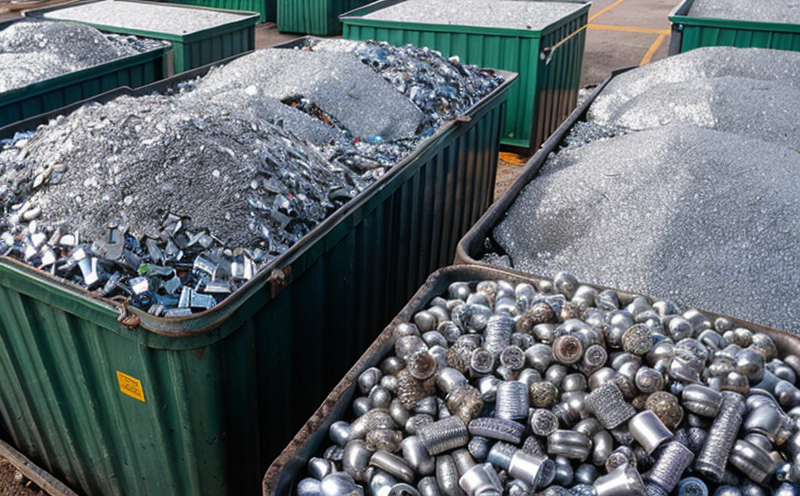ASTM E164 Recycled Alloy Impact Strength Determination
The ASTM E164 Recycled Alloy Impact Strength Determination is a critical test used to evaluate the toughness and durability of metal alloys that have been recycled. This test assesses how well a given alloy can resist impact without fracturing, which is essential for ensuring the quality and reliability of recycled materials in various applications.
The procedure outlined in ASTM E164 involves subjecting a notched specimen to a controlled impact using an impact testing machine. The absorbed energy during this process determines the material's toughness, providing insights into its ability to absorb shock without breaking. This test is particularly important for industries dealing with metal recycling, as it helps ensure that recycled materials meet or exceed the performance standards of newly manufactured alloys.
The specimen used in ASTM E164 testing is typically a standard notched bar made from the recycled alloy being tested. The process involves several steps: preparing the specimen, conditioning it to specified temperature and humidity levels, performing the impact test, and measuring the energy absorbed by the material during the impact. Compliance with these procedures ensures accurate and reliable results.
Understanding the impact strength of recycled alloys is crucial for industries that rely on these materials for manufacturing components subjected to mechanical stress or shock. This includes sectors such as automotive, aerospace, and construction, where durability and safety are paramount. By conducting ASTM E164 testing, manufacturers can ensure that their recycled alloy products meet the necessary quality standards.
The test results provide valuable data for R&D engineers in optimizing recycling processes to enhance material properties. For quality managers and compliance officers, this information is vital for ensuring regulatory compliance and maintaining product integrity. Additionally, ASTM E164 testing plays a key role in sustainable practices by promoting the use of recycled materials that meet stringent performance criteria.
In summary, the ASTM E164 Recycled Alloy Impact Strength Determination test is essential for assessing the toughness and durability of metal alloys used in various applications across different industries. This ensures not only product quality but also supports sustainability efforts by validating the use of recycled materials.
- Ensures compliance with international standards
- Provides accurate and reliable results
- Supports sustainable practices through validated recycled material use
- Facilitates optimization of recycling processes
Industry Applications
The ASTM E164 Recycled Alloy Impact Strength Determination test finds extensive application in industries that deal with the processing, manufacturing, and utilization of recycled metal alloys. Key sectors include automotive manufacturers, aerospace companies, construction firms, and recycling facilities.
- Automotive Industry: Ensures safety by verifying the toughness of recycled steel used in vehicle components subjected to impact forces.
- Aerospace Sector: Validates the durability of recycled aluminum alloys used in aircraft structures that must withstand harsh environmental conditions and stress.
- Construction Industry: Guarantees the integrity of recycled structural steels used in building frameworks designed to endure seismic activities or other mechanical stresses.
- Recycling Facilities: Helps in optimizing recycling processes by providing insights into material properties, ensuring the highest quality recycled alloys are produced.
In these industries, ASTM E164 testing is a cornerstone of quality assurance and compliance. It ensures that recycled metals meet stringent performance criteria, enhancing product reliability and safety while supporting sustainable practices.
Why Choose This Test
The ASTM E164 Recycled Alloy Impact Strength Determination test offers several compelling reasons why it is the preferred choice for evaluating recycled metal alloys. First and foremost, this test provides a standardized method to assess the toughness of materials, ensuring consistent results across different laboratories and facilities.
- Consistency: ASTM E164 ensures that all tests follow the same protocols, leading to reliable and reproducible results.
- Regulatory Compliance: By meeting international standards, this test supports compliance with regulatory requirements in various regions.
- Sustainability: The use of recycled materials validated by ASTM E164 contributes significantly to sustainable practices.
- Quality Assurance: This test helps manufacturers ensure that their products meet the necessary quality and performance standards.
- Optimization of Processes: By understanding material properties, R&D engineers can optimize recycling processes for better outcomes.
The high degree of accuracy provided by ASTM E164 testing makes it an indispensable tool in industries that rely heavily on recycled metal alloys. It ensures not only product quality but also supports sustainable practices and regulatory compliance.
Environmental and Sustainability Contributions
The ASTM E164 Recycled Alloy Impact Strength Determination test plays a pivotal role in promoting sustainability by validating the use of recycled materials that meet stringent performance criteria. This is particularly important in an era where environmental consciousness is at the forefront of global concerns.
By ensuring that recycled metal alloys are as tough and durable as their virgin counterparts, ASTM E164 testing supports the shift towards a circular economy. This approach not only reduces waste but also conserves natural resources by reusing existing materials in manufacturing processes. The test results provide crucial data for optimizing recycling processes, allowing manufacturers to produce high-quality recycled metals that can be used in critical applications.
The use of ASTM E164 validated materials has a direct positive impact on the environment. By promoting the reuse of metal alloys, this test contributes to reducing greenhouse gas emissions associated with the extraction and processing of virgin raw materials. This shift towards sustainability not only benefits the immediate industry but also has broader implications for environmental health.
Moreover, ASTM E164 testing supports compliance with international standards such as ISO 9001, ISO 14001, and ISO/TS 22163, which are essential for maintaining a high level of quality and sustainability in manufacturing processes. By adhering to these standards, industries can ensure that their products not only meet performance requirements but also align with global sustainability goals.





